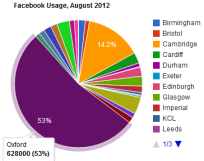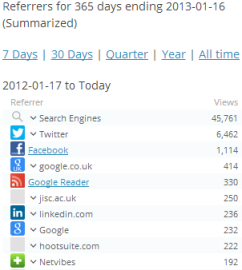What Could Facebook’s New Search System Offer Researchers?
Posted by Brian Kelly on 16 Jan 2013
Facebook’s Graph Search Beta Targets Google
 Yesterday my Twitter stream was full of tweets about Facebook’s announcement that they were Introducing Graph Search Beta – and this morning the headline Facebook’s Search for Supremacy featured on the front page of the Metro newspaper.
Yesterday my Twitter stream was full of tweets about Facebook’s announcement that they were Introducing Graph Search Beta – and this morning the headline Facebook’s Search for Supremacy featured on the front page of the Metro newspaper.
The significance of this announcement can be gauged by the BBC news headline: Facebook’s Graph targets Google in which Rory Cellan-Jones, the BBC’s technology correspondent, describes how his initial scepticism may have been misplaced: “If [Facebook’s] Graph Search more closely resembles what Bing describes, then users will be able to stay on Facebook, earning the company huge advertising revenues as they search for goods and services“.
A TechCrunch article which asks “What Can You Search For On Facebook Graph Search?” has focussed on the social aspects of this development (dating, finding places to eat and drink, etc.). But what could Facebook’s new search system offer researchers?
What Does The Evidence Tell Us?
Importance of Evidence
Although people may be tempted to be instinctively dismissive of any developments to Facebook, as described in a paper on “What Next for Libraries? Making Sense of the Future” (available in PDF and MS Word formats)” involvement with work of the Jisc Obervatory has led to a greater emphasis on evidence-gathering. In addition the Jisc Inform article which announced “A Bright Future for Independent Jisc in 2013” described how a greater emphasis for development work will be based on the needs of the institutions. There will therefore be a need to gather evidence on how Facebook is being used across UK higher and further educational institutions in order to understand whether Facebook developments can enhance uses of made of Facebook to support institutional activities.
Institutional Use of Facebook

Facebook ‘Likes’ Across Russell Group Universities
Back in November 2007 a post on UK Universities On Facebook provided early evidence of use of Facebook by early adopters, when there were only about 76 universities with a Facebook presence. A year later a post on Revisiting UK University Pages On Facebook started to keep a record of Facebook usage by the early institutional adopters. More recently a post on Over One Million ‘Likes’ of Facebook Pages for the 24 Russell Group Universities provided an indication of the scale of use of Facebook across a selection of UK universities.
This might suggest that the enhanced searching techniques announced yesterday may be relevant for those involved in university marketing activities, although there may be some interesting privacy issues to be addressed.
But beyond use of Facebook by students, what about its potential to support researchers?
Use of Facebook by Researchers
 As described in a post of The Sixth Anniversary of the UK Web Focus Blog Facebook is “in third place behind Search Engines and Twitter in referring traffic to this blog” (as illustrated). This suggests that Facebook may have a role to play in supporting dissemination activities for bloggers. But does Facebook have any relevance for enhancing the dissemination of research papers, beyond the indirect dissemination which research blogs may provide?
As described in a post of The Sixth Anniversary of the UK Web Focus Blog Facebook is “in third place behind Search Engines and Twitter in referring traffic to this blog” (as illustrated). This suggests that Facebook may have a role to play in supporting dissemination activities for bloggers. But does Facebook have any relevance for enhancing the dissemination of research papers, beyond the indirect dissemination which research blogs may provide?
A year ago a post entitled Facebook and Twitter as Infrastructure for Dissemination of Research Papers (and More) described the SpringerLink mobile app.
 Earlier today I used the app to search for papers on ‘Web Accessibility. As illustrated a relevant paper can be shared across my professional networks using Twitter or Facebook as well as sharing with selected individuals using email.
Earlier today I used the app to search for papers on ‘Web Accessibility. As illustrated a relevant paper can be shared across my professional networks using Twitter or Facebook as well as sharing with selected individuals using email.
As I described in the blog post “the Springlink app suggests that Facebook and Twitter may be becoming part of the dissemination infrastructure for research papers, especially on mobile devices“. But is there any evidence that researchers are using Facebook, in particular, to facilitate access to research papers?
Back in October 2012 a series of guest blog posts were published during Open Access Week 2012 in order to share the experiences of a number of institutional repository managers. In the posts on SEO Analysis of WRAP, the Warwick University Repository by Yvonne Budden, University of Warwick and on SEO Analysis of LSE Research Online by Natalia Madjarevic, LSE there was no evidence that Facebook was a significant driver of traffic to the two repositories, according to the MajesticSEO tool used to carry out the analyses. This was echoed by William Nixon in his post on SEO Analysis of Enlighten, the University of Glasgow Institutional Repository. William described how:
Social media sites such as Facebook and Twitter don’t appear in these initial results, it may be because the volume is insufficient to be ranked here or there may be breach of service issues. Google Analytics now provides some social media tools and we have been identifying our most popular papers from Facebook and Twitter.
Reading William’s post on the Enlighten blog it seems:
Looking at the data for the past year the following papers have had significant numbers of referrals from Facebook:
van Dommelen, P., Gómez Bellard, C., and Pérez Jordà, G. (2010)Produzione agraria nella Sardegna punica fra cereali e vino. In: Milanese, M., Ruggeri, P., Vismara, C. and Zucca, R. (eds.) L’Africa Romana. I Luoghi e le Forme dei Mestieri e della Produzione nelle Province Africane (Atti del XVIII Convegno di Studio, Olbia, 11-14 Dicembre 2008). Series: L’Africa Romana (18). Carocci, Rome, Italy, pp. 1187-1202. ISBN 9788843054916. http://eprints.gla.ac.uk/48143/
Cockshott, W.P., and Zachriah, D. (2012) Arguments for Socialism.Amazon. ISBN B006S2LW6U. http://eprints.gla.ac.uk/58987/
So at this stage it would appear that this is little evidence that Facebook has a significant role to play in enhancing access to papers hosted in institutional repositories. But are the experiences from these three institutional repositories typical across the sector? Might the early adopters, such as P van Dommelen and W. P. Cockshot and their co-authors be gaining advantages in enhancing access to their papers? And, finally, might the announcement of Facebook’s Graph Search prove of relevance to those with an interest in enhancing the discoverability of research papers?
I’ve asked questions, rather than suggested answers in this post. In part that is because the potential relevance of Facebook’s Graph Search will be based on the use of Facebook, rather than advocacy or critique of use of Facebook in a scholarly context. I’d therefore welcome comments from repository managers, in particular, on evidence of Facebook as a driver of traffic (whether large or small) to institutional repositories. For those who may not wish to leave a comment I’ve created two polls: one of the amount of traffic provided by Facebook and the other on interest in understanding the potential of use of Facebook’s Graph Search in a repository context.
Finally, if you’d like to know more about Facebook’s Graph Search, the following links may be of interest:
- Background:www.facebook.com/graphsearch
- To learn about Graph Search and privacy: www.facebook.com/about/graphsearch/privacy
- How Graph Search was built: click here.
- A behind the scenes video, click here.
- A collection of screen shots, click here.
- How Graph Search can help people discover your business, visit Facebook Studio
View Twitter conversation from: [Topsy] | View Twitter statistics from: [Bit.ly]




Evaluating Facebook Graph search as an epistemic tool « Finding Knowledge said
[…] What Could Facebook’s New Search System Offer Researchers? from Brian Kelly and […]
Don’t Leave Instagram (or Facebook, Google Drive, …) Until You’ve Considered the Implications « UK Web Focus said
[…] What Could Facebook’s New Search System Offer Researchers? […]